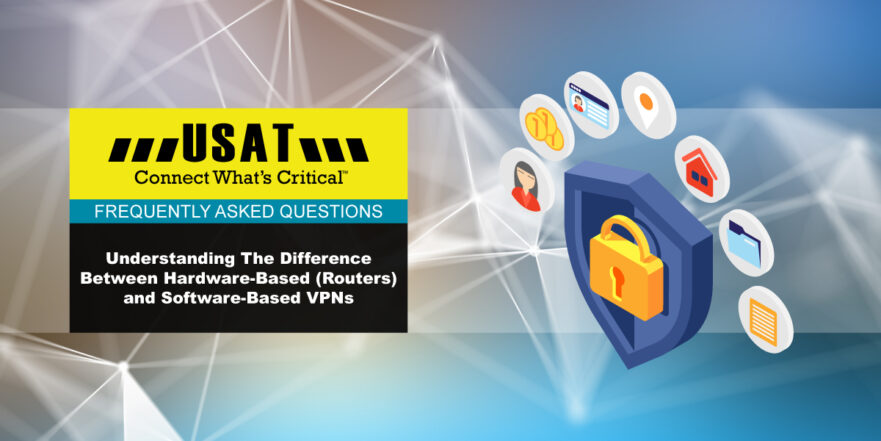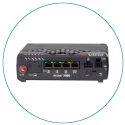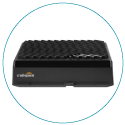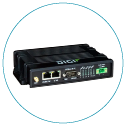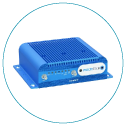VPNs Help Increase Data Security and Privacy
In the modern digital landscape, where privacy breaches and data thefts are rising, safeguarding your online activities has never been more essential. As technology advances, Virtual Private Networks (VPNs) have emerged as the preferred solution for individuals and businesses concerned about fortifying their internet traffic security and bolstering their privacy.
Virtual Private Networks - or VPNs - establish a secure connection between a user's device and the internet, encrypting the data sent and received. By rerouting your internet connection through a distant server, VPNs obscure your IP address and geographical location, creating a virtual tunnel shielding your online activities from prying eyes.
VPNs are critical in securing internet traffic through data encryption, rendering it indecipherable to anyone attempting to intercept it. This encryption protects sensitive information, such as passwords, credit card details, and confidential communications, shielding them from potential hackers.
Additionally, VPNs enhance privacy by anonymizing your online presence. VPNs make it challenging for third parties to monitor or trace your online activities by directing your internet traffic through servers in various global locations. This feature proves particularly valuable when using public Wi-Fi networks, where hackers often lurk, seeking to exploit vulnerable connections.
Router VPNs
Establishing a VPN Connection Directly on Your Router
The Advantages of Using a Router VPN
Network-Wide Security
With a router VPN, every device connected automatically enjoys VPN protection. This encompasses computers, smartphones, smart TVs, gaming consoles, and any other device linked to your network. There's no need for individual setup on each device.
Device-Agnostic VPN
Concurrent VPN Connections for Multiple Devices
Setting up and Managing Router-Based VPNs
Firmware Installation on Routers
VPN Settings Configuration on Routers
Addressing Common Setup Issues
Software VPNs
Compatibility with Diverse Devices and Operating Systems
Prominent Software VPN Options
Attributes, Benefits, and Limitations of Software VPNs
Robust Security
Flexibility
Unrestricted Access to Geo-Restricted Content
Software VPNs empower you to circumvent geo-blocking measures, granting access to region-restricted websites and streaming platforms.
Nevertheless, it's vital to acknowledge certain limitations associated with software VPNs:
Device-Specific Dependence
Performance Implications
Subscription Costs
VPN Protocols
OpenVPN
IPSec
L2TP
PPTP
Comparing Protocol Support Between Router VPN and Software VPN
Router VPNs
Software VPNs
On the other hand, software VPN solutions typically offer more extensive protocol support. This versatility allows users to select from various options, including OpenVPN, IPSec, L2TP, and PPTP. This adaptability renders software VPNs particularly appealing to users with specific protocol preferences or those necessitating protocol switches to align with their distinct requirements.
Regarding security and performance, individual protocols carry distinct attributes and capabilities.
Security and Performance Attributes of Different VPN Protocols
OpenVPN
IPSec
L2TP
PPTP
Renowned for its swift connection speeds, PPTP falls short in terms of security compared to other protocols. Its encryption is less formidable and potentially more susceptible to certain attacks.
Selecting a VPN protocol should align with your specific requirements and priorities. OpenVPN and IPSec are generally favored by users who prioritize security, while L2TP and PPTP can be fitting choices for those who prioritize ease of use and performance. When opting for a VPN solution, meticulous consideration of protocol support, security levels, and performance is vital to guarantee an optimal VPN experience.
Enhancing Security and Privacy with VPNs
The Role of VPNs in Comprehensive Security and Privacy
Strength of Encryption and Data Shielding Afforded by VPNs
When choosing between a router VPN and a software VPN, the critical considerations revolve around encryption strength and the level of data safeguarding provided. Both alternatives offer resilient encryption protocols, such as OpenVPN and IPSec, that furnish impenetrable shields against unauthorized access to your data.
Software VPNs typically present a higher degree of flexibility regarding encryption potency. Users can tailor and select distinct encryption algorithms contingent upon their specific security prerequisites. In contrast, router VPNs generally provide a pre-configured encryption setup.
These VPN solutions empower you to assert control over your security and privacy, ensuring your online interactions are shielded from prying eyes.
Preserving Anonymity and Evaluating Logging Policies of VPN Services
Anonymity stands as a cornerstone of online privacy. VPN services uphold this anonymity by concealing your IP address and directing your internet traffic through secure servers across different countries.
This layered approach makes tracing your online activities back to your true identity nearly impossible. However, it's imperative to recognize that not all VPN providers adhere to identical logging policies.
Divergent practices exist within the VPN landscape, ranging from services that maintain comprehensive logs of your online endeavors to those upholding stringent no-logs policies. Therefore, thoroughly reviewing the provider's privacy policy is indispensable when planning the VPN selection journey. This scrutiny ensures alignment with your objectives, particularly concerning collecting and retaining personally identifiable information.
Privacy Implications in the Router VPN vs. Software VPN Dilemma
The selection between a router VPN and a software VPN can introduce distinct privacy considerations. With a router VPN, every device linked to the router reaps the benefits of the VPN's encryption and security layers. This all-encompassing protection proves invaluable, especially in households or small businesses where multiple devices necessitate secure internet access.
Conversely, software VPNs extend individual control and customization privileges. Users wield the authority to designate which devices or applications traverse the VPN, thereby affording heightened control over privacy and security configurations. This degree of granular control proves advantageous when specific devices or applications warrant VPN safeguarding.
Ultimately, the preference for a router VPN or a software VPN hinges on the user's nuanced security and privacy prerequisites. Both avenues offer potent protection, with different degrees of control and customization in privacy.
Navigating Device Compatibility in VPN Selection
Device compatibility emerges as a pivotal factor when deciding between a router VPN and a software VPN. VPN solutions exhibit variations in their adeptness at accommodating different devices and operating systems, each presenting unique considerations.
When it comes to device compatibility, both router VPN and software VPN showcase distinct merits and limitations:
Compatibility of VPN Solutions with Diverse Devices and Operating Systems
Windows
macOS
Android
iOS
Support for Windows, macOS, Android, and iOS Devices
Ease of Setup and Configuration on Varied Devices
In the arena of setup and configuration convenience, software VPNs generally exhibit an edge over router VPNs. Software VPNs frequently offer user-friendly interfaces, facilitating swift and intuitive.
VPN setup and configuration on many devices. Conversely, router VPNs might necessitate manual configuration, a process that could prove more time-intensive and intricate for some users.
Therefore, the selection between a router VPN and a software VPN should be governed by a comprehensive assessment of your particular devices and operating systems. A profound comprehension of their compatibility and setup ease will empower you to make an informed choice, aligning your VPN solution with your unique requirements.
Exploring Vital Use Cases and Scenarios for VPNs
Remote Work and VPN Usage
Bypassing Geo-Restrictions and Accessing Blocked Content
Enhancing Online Security on Public Networks
Other Popular Use Cases for Router VPNs and Software VPNs
Safe Torrenting
Gaming
Data Encryption
Online Anonymity
About MCA and Our CNS Team
MCA is one of the largest and most trusted integrators in the United States, offering world-class voice, data, and security solutions that enhance the quality, safety, and productivity of customers, operations, and lives. More than 65,000 customers trust MCA to provide carefully researched solutions for a safe, secure, and more efficient workplace.
Our Cellular Networking Solutions (CNS) team (formerly known as USAT) is made up of certified experts in designing and deploying fixed and mobile wireless data connectivity solutions for public and private enterprises nationwide - complete with implementation, training, proof of concept (POC), system auditing, and on-site RF surveying services with optional engineering maintenance contracts.
Our extensive catalog of world-class routers, gateways, and software designed for remote monitoring and management in even the harshest environments allows us to deliver a full suite of reliable technologies capped with a service-first approach.
Share this Post

